GreptimeDB 的车云一体方案已成功应用于头部新能源车企,解决了毫秒级信号的采集、存储和分析问题,为企业带来了显著的降本增效成果——数据的流量和存储成本更低,数据分析更实时。
但是为了更加全面地评估 GreptimeDB 在嵌入式和边缘计算环境中的性能,我们将其与 SQLite 进行了详细的对比测试。本次测试的目的是评估它们在类似应用场景中的数据处理性能,以验证 GreptimeDB 在物联网,车联网和可观测应用环境中的适应性和优势。
SQLite 是一个小巧、快速并且功能齐全的 SQL 数据库引擎,它被认为是世界上使用最广泛的数据库系统,能够部署在各类移动设备(比如手机、机顶盒、电视)及嵌入到本地应用程序中等等。
本文将对比 GreptimeDB 和 SQLite 在高通骁龙 8155 智能座舱芯片平台上的性能表现,包括读写性能、资源占用和压缩率等。
测试环境
硬件平台:
| Chipset(芯片版本) | Qualcomm Technologies, Inc SA8155P |
| Memory(内存) | 12 GB |
| Storage(存储) | eMMC NAND Flash |
软件版本:
| GreptimeDB Edge | v1.0 商用版 |
| SQLite | 3.46.0,基于 rusqlite 包装 https://github.com/rusqlite/rusqlite |
软件配置
两者都关闭 WAL,默认关闭 GreptimeDB Edge,通过下列命令关闭 SQLite 的 journal 和同步写入:
PRAGMA journal_mode=OFF;
PRAGMA synchronous=OFF;
其他都为默认配置。
测试数据和方法
测试数据
我们同样采用 TSBS 生成的 CPU 监控数据,总共 1000 万行,每行数据有 10 个 Tag 和 Field,加上时间戳,总共 21 个列,样例数据如下:
cpu,hostname=host_0,region=eu-central-1,datacenter=eu-central-1a,rack=6,os=Ubuntu15.10,arch=x86,team=SF,service=19,service_version=1,service_environment=test usage_user=58i,usage_system=2i,usage_idle=24i,usage_nice=61i,usage_iowait=22i,usage_irq=63i,usage_softirq=6i,usage_steal=44i,usage_guest=80i,usage_guest_nice=38i 1686441600000000000
建表语句参考附录。SQLite 只对
hostname和ts列做主键索引,这两个列是查询需要,没有将其他 tag 列加入到主键,因为写入性能会非常差。GreptimeDB 索引了所有 tag 列,ts是TIME INDEX约束,并启用了 append 模式。
写入方式
- GreptimeDB Edge 采用商用 SDK 基于共享内存方式写入,写入效率更高;
- SQLite 采用批量写入的方式,多行数据合并成单个 INSERT 语句并调用
sqlite3_step执行,批次大小设置为 32,经过测试,使用更大的批大小对整体吞吐影响不大。
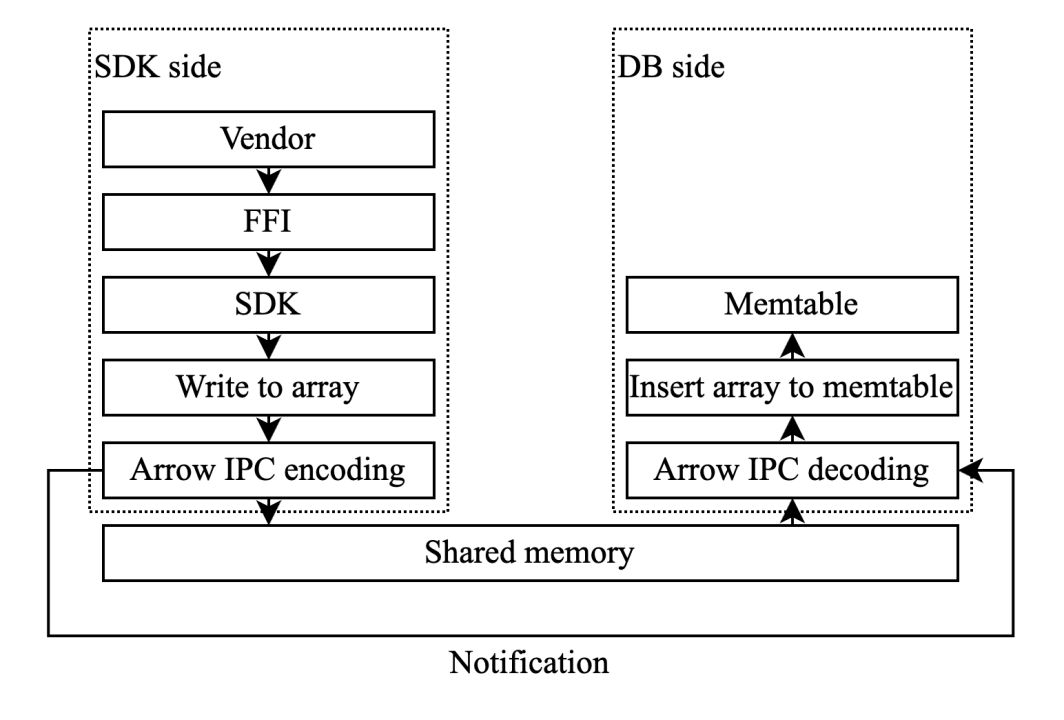
(图 1 :GreptimeDB Edge 基于共享内存的写入更高效)
查询方式
写入 1000 万行后执行 SQL 查询,我们从 TSBS 查询场景中挑选了 7 条 SQL 执行,覆盖典型场景,具体见附录。
测试报告
写入性能
由于 SQLite 并不支持多线程的并发写入 ,我们测试了单核极限写入场景:
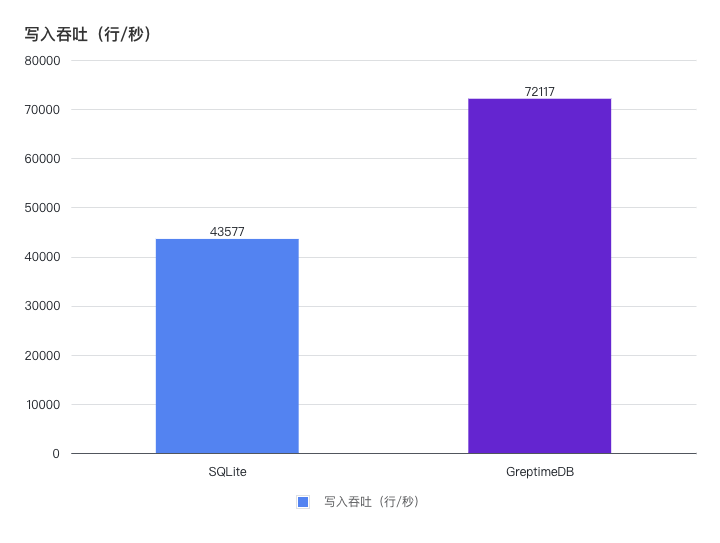
(图 2 :单核极限写入场景性能对比)
GreptimeDB 写入 TPS 大概是 SQLite 的 1.7 倍,达到 7.2 万行每秒。
我们单独测试了 GreptimeDB 的并发写入性能,在平均 160% CPU 消耗并且将 I/O(Input/Output) 打满的情况下,达到了 10 万行每秒的写入性能。
压缩率
除了写入性能外,嵌入式数据库的磁盘占用同样值得关注。由于嵌入式设备往往存储空间并不是很充裕,而且其所使用的存储介质通常为 Flash 闪存,因此如果磁盘占用过大,不仅会导致能够保存的数据量受限,而且会大大缩短存储介质的寿命。在本次测试中,我们将 1000 万行数据全部写入到 GreptimeDB 和 SQLite 后,分别测量两者数据目录所占用的大小。
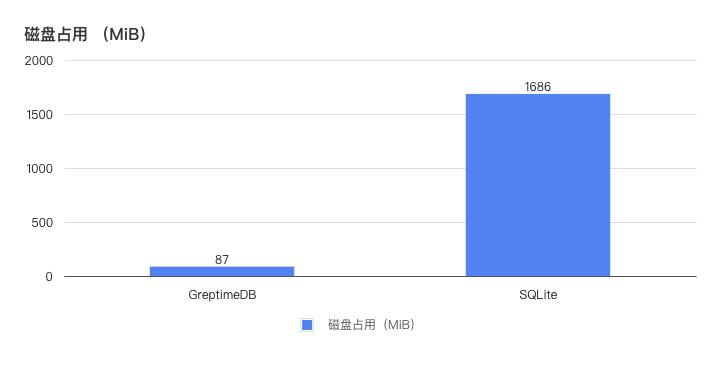
(图 3 :压缩率对比)
得益于 GreptimeDB Edge 所使用的列式存储的极高的压缩率,最终其所占用空间仅为 87MB,而 SQLite 需要 1,686 MB, GreptimeDB 的压缩率是 SQLite 的 19 倍。
资源占用
我们将写入限流为 43000 行每秒,测量下 GreptimeDB 和 SQLite 的 CPU 和内存占用:
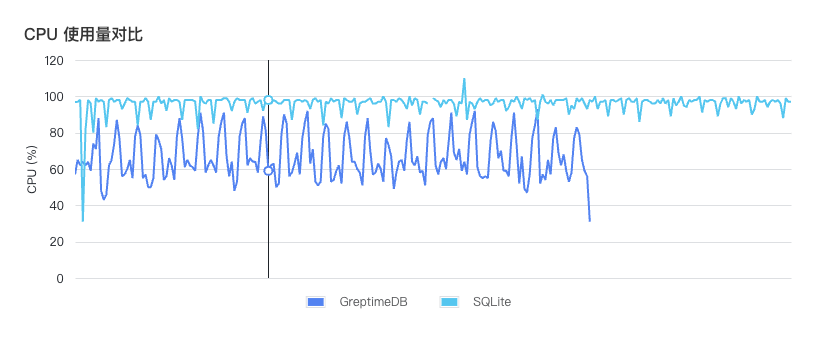
图 4 :CPU使用量对比
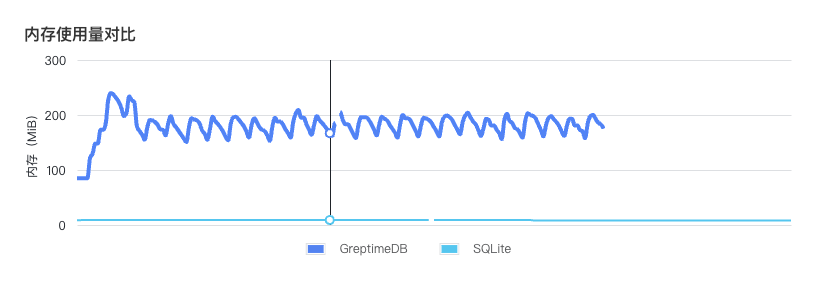
图 5 :内存使用量对比
结论:
- GreptimeDB 的 CPU 占用更低,仅为 67%,而 SQLite 为 96%
- SQLite 的写入过程几乎没有内存分配,优化的非常好,内存稳定地保持在 10MB,而 GreptimeDB Edge 需要消耗 200MB 内存。
- GreptimeDB Edge 的内存大小可以通过配置优化,得益于良好的架构设计, GreptimeDB Edge 可以在 CPU、内存和压缩率三者之间,根据用户需求灵活通过配置来平衡。
查询性能
我们选取的 7 条典型 SQL 的查询结果如下(查询耗时,单位:毫秒):
| 查询场景 | SQLite | GreptimeDB | 查询场景说明 |
| FIVE_MINUTE_1 | 1 | 33 | 查询 1 个主机最近 5 分钟所有指标数据 |
| COUNT | 252 | 11 | 统计总行数 |
| CPU_MAX_ALL_1 | 16 | 52 | 查询 1 个主机 8 个小时内每小时所有 CPU 指标的最大值 |
| CPU_MAX_ALL_8 | 119 | 78 | 查询 8 个主机 8 个小时内每小时所有 CPU 指标的最大值 |
| SINGLE_GROUP_BY_1_1_1 | 145 | 105 | 查询 1 个主机 1 个小时内 1 个 CPU 指标每分钟的最大值 |
| LAST_POINT_ALL | 1246 | 1860 | 所有主机的最新一行数据 |
| LAST_POINT_ONE | 118 | 140 | 1 个主机的最新一行数据 |
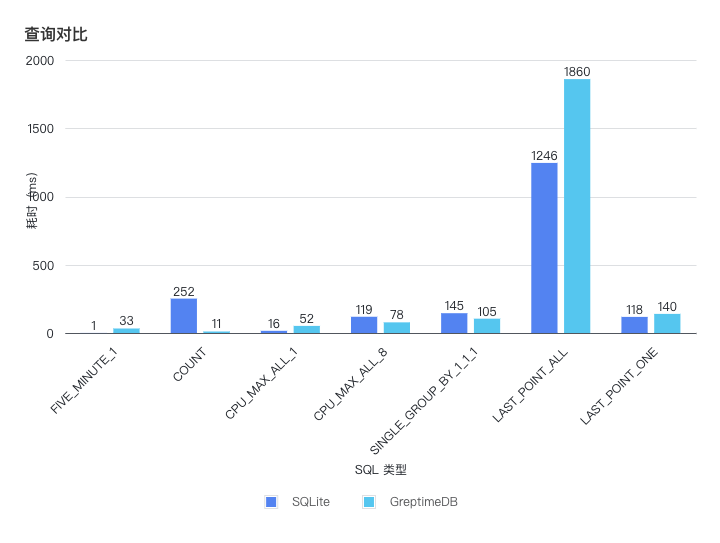
(图 6 :查询对比)
可以看到,SQLite 的查询性能相当出色,而 GreptimeDB Edge 也没有明显落后,并且在时序聚合查询场景更快。
总结
在高通 8155 芯片平台上,GreptimeDB Edge 的写入性能是 SQLite 的 1.7 倍,数据压缩率是 SQLite 的 19 倍,查询性能在时序聚合场景更优,资源占用方面 CPU 消耗更低,内存消耗较大,但是可以通过配置灵活地在 CPU、内存和压缩率三者之间分配。
本测试使用的 GreptimeDB Edge 商用版还是 1.0 版本,最新研发的 2.0 版本将支持日志引擎、轻量级流计算引擎 Flow 以及专为嵌入式 LLM 应用设计的向量检索的能力,并且在读写性能和资源占用做出进一步的优化。Greptime 边云一体方案显著降低数据的流量和存储成本,赋能边缘计算,并在边云之间灵活协调算力。
如果您对 GreptimeDB Edge 商用版在智能汽车等边缘环境的使用感兴趣,欢迎联系我们做进一步的交流。
附录
建表语句
GreptimeDB
CREATE TABLE IF NOT EXISTS cpu (
hostname STRING NULL,
region STRING NULL,
datacenter STRING NULL,
rack STRING NULL,
os STRING NULL,
arch STRING NULL,
team STRING NULL,
service STRING NULL,
service_version STRING NULL,
service_environment STRING NULL,
usage_user BIGINT NULL,
usage_system BIGINT NULL,
usage_idle BIGINT NULL,
usage_nice BIGINT NULL,
usage_iowait BIGINT NULL,
usage_irq BIGINT NULL,
usage_softirq BIGINT NULL,
usage_steal BIGINT NULL,
usage_guest BIGINT NULL,
usage_guest_nice BIGINT NULL,
ts TIMESTAMP(9) NOT NULL,
TIME INDEX (ts),
PRIMARY KEY (hostname, region, datacenter, rack, os, arch, team, service, service_version, service_environment)
) with (append_mode='true');
SQLite
CREATE TABLE IF NOT EXISTS cpu (
hostname VARCHAR NULL,
region VARCHAR NULL,
datacenter VARCHAR NULL,
rack VARCHAR NULL,
os VARCHAR NULL,
arch VARCHAR NULL,
team VARCHAR NULL,
service VARCHAR NULL,
service_version VARCHAR NULL,
service_environment VARCHAR NULL,
usage_user BIGINT NULL,
usage_system BIGINT NULL,
usage_idle BIGINT NULL,
usage_nice BIGINT NULL,
usage_iowait BIGINT NULL,
usage_irq BIGINT NULL,
usage_softirq BIGINT NULL,
usage_steal BIGINT NULL,
usage_guest BIGINT NULL,
usage_guest_nice BIGINT NULL,
ts TIMESTAMP NOT NULL,
PRIMARY KEY (hostname, ts)
);
查询语句
1. FIVE_MINUTE_1E
SELECT * FROM cpu WHERE hostname='host_1701' AND ts>='2016-01-01T00:00:00Z' AND ts<'2016-01-01T00:05:00';
2. COUNT
SELECT count(*) FROM cpu;
3. CPU_MAX_ALL_1
-- GreptimeDB
SELECT
max(usage_user),
max(usage_system),
max(usage_idle),
max(usage_nice),
max(usage_iowait),
max(usage_irq),
max(usage_softirq),
max(usage_steal),
max(usage_guest),
max(usage_guest_nice),
date_trunc('hour', ts)
FROM
cpu
WHERE
hostname = 'host_1435' AND
ts >= '2016-01-01T00:00:00Z' AND
ts < '2016-01-01T08:00:00Z'
GROUP BY
date_trunc('hour', ts);
-- SQLite
SELECT
max(usage_user),
max(usage_system),
max(usage_idle),
max(usage_nice),
max(usage_iowait),
max(usage_irq),
max(usage_softirq),
max(usage_steal),
max(usage_guest),
max(usage_guest_nice),
strftime('%Y-%m-%dT%H:00:00', ts)
FROM
cpu
WHERE
hostname = 'host_1435' AND
ts >= '2016-01-01T00:00:00Z' AND
ts < '2016-01-01T08:00:00Z'
GROUP BY
strftime('%Y-%m-%dT%H:00:00', ts);
4. CPU_MAX_ALL_8
SELECT
max(usage_user),
max(usage_system),
max(usage_idle),
max(usage_nice),
max(usage_iowait),
max(usage_irq),
max(usage_softirq),
max(usage_steal),
max(usage_guest),
max(usage_guest_nice),
date_trunc('hour', ts)
FROM
cpu
WHERE
(
hostname = 'host_249' OR
hostname = 'host_1403' OR
hostname = 'host_1435' OR
hostname = 'host_3539' OR
hostname = 'host_3639' OR
hostname = 'host_3075' OR
hostname = 'host_815' OR
hostname = 'host_2121'
) AND
ts >= '2016-01-01T00:00:00Z' AND
ts < '2016-01-01T08:00:00Z'
GROUP BY
date_trunc('hour', ts)
-- SQLite
SELECT
max(usage_user),
max(usage_system),
max(usage_idle),
max(usage_nice),
max(usage_iowait),
max(usage_irq),
max(usage_softirq),
max(usage_steal),
max(usage_guest),
max(usage_guest_nice),
strftime('%Y-%m-%dT%H:00:00', ts)
FROM
cpu
WHERE
(
hostname = 'host_249' OR
hostname = 'host_1403' OR
hostname = 'host_1435' OR
hostname = 'host_3539' OR
hostname = 'host_3639' OR
hostname = 'host_3075' OR
hostname = 'host_815' OR
hostname = 'host_2121'
) AND
ts >= '2016-01-01T00:00:00Z' AND
ts < '2016-01-01T08:00:00Z'
GROUP BY
strftime('%Y-%m-%dT%H:00:00', ts);
5. SINGLE_GROUP_BY_1_1_1
SELECT
max(usage_user),
date_trunc('minute', ts)
FROM
cpu
WHERE
(hostname = 'host_3701') AND
ts >= '2016-01-01T00:00:00Z' AND
ts < '2016-01-01T08:00:00Z'
GROUP BY
date_trunc('minute', ts)
-- SQLite
SELECT
max(usage_user),
strftime('%Y-%m-%dT%H:%M:00', ts)
FROM
cpu
WHERE
(hostname = 'host_1701') AND
ts >= '2016-01-01T00:00:00Z' AND
ts < '2016-01-01T08:00:00Z'
GROUP BY
strftime('%Y-%m-%dT%H:%M:00', ts);
6. LAST_POINT_ALL
-- GreptimeDB
SELECT
last_value(hostname order by ts),
last_value(region order by ts),
last_value(datacenter order by ts),
last_value(rack order by ts),
last_value(os order by ts),
last_value(arch order by ts),
last_value(team order by ts),
last_value(service order by ts),
last_value(service_version order by ts),
last_value(service_environment order by ts),
last_value(usage_user order by ts),
last_value(usage_system order by ts),
last_value(usage_idle order by ts),
last_value(usage_nice order by ts),
last_value(usage_iowait order by ts),
last_value(usage_irq order by ts),
last_value(usage_softirq order by ts),
last_value(usage_steal order by ts),
last_value(usage_guest order by ts),
last_value(usage_guest_nice order by ts)
FROM cpu GROUP BY hostname;
--SQLite
SELECT
last_value(hostname) over(order by ts),
last_value(region) over(order by ts),
last_value(datacenter) over(order by ts),
last_value(rack) over(order by ts),
last_value(os) over(order by ts),
last_value(arch) over(order by ts),
last_value(team) over(order by ts),
last_value(service) over(order by ts),
last_value(service_version) over(order by ts),
last_value(service_environment) over(order by ts),
last_value(usage_user) over(order by ts),
last_value(usage_system) over(order by ts),
last_value(usage_idle) over(order by ts),
last_value(usage_nice) over(order by ts),
last_value(usage_iowait) over(order by ts),
last_value(usage_irq) over(order by ts),
last_value(usage_softirq) over(order by ts),
last_value(usage_steal) over(order by ts),
last_value(usage_guest) over(order by ts),
last_value(usage_guest_nice) over(order by ts)
FROM cpu GROUP BY hostname;
7. LAST_POINT_ONE
-- GreptimeDB Edge
SELECT
last_value(hostname order by ts),
last_value(region order by ts),
last_value(datacenter order by ts),
last_value(rack order by ts),
last_value(os order by ts),
last_value(arch order by ts),
last_value(team order by ts),
last_value(service order by ts),
last_value(service_version order by ts),
last_value(service_environment order by ts),
last_value(usage_user order by ts),
last_value(usage_system order by ts),
last_value(usage_idle order by ts),
last_value(usage_nice order by ts),
last_value(usage_iowait order by ts),
last_value(usage_irq order by ts),
last_value(usage_softirq order by ts),
last_value(usage_steal order by ts),
last_value(usage_guest order by ts),
last_value(usage_guest_nice order by ts)
FROM cpu
WHERE hostname='host_1701'
-- SQLite
SELECT
last_value(hostname) over(order by ts),
last_value(region) over(order by ts),
last_value(datacenter) over(order by ts),
last_value(rack) over(order by ts),
last_value(os) over(order by ts),
last_value(arch) over(order by ts),
last_value(team) over(order by ts),
last_value(service) over(order by ts),
last_value(service_version) over(order by ts),
last_value(service_environment) over(order by ts),
last_value(usage_user) over(order by ts),
last_value(usage_system) over(order by ts),
last_value(usage_idle) over(order by ts),
last_value(usage_nice) over(order by ts),
last_value(usage_iowait) over(order by ts),
last_value(usage_irq) over(order by ts),
last_value(usage_softirq) over(order by ts),
last_value(usage_steal) over(order by ts),
last_value(usage_guest) over(order by ts),
last_value(usage_guest_nice) over(order by ts)
FROM cpu
WHERE hostname='host_1701'
如果您对 GreptimeDB Edge 商用版在智能汽车等边缘环境的使用感兴趣,欢迎联系我们做进一步的交流。
关于 Greptime
Greptime 格睿科技专注于为可观测、物联网及车联网等领域提供实时、高效的数据存储和分析服务,帮助客户挖掘数据的深层价值。目前基于云原生的时序数据库 GreptimeDB 已经衍生出多款适合不同用户的解决方案,更多信息或 demo 展示请联系下方小助手(微信号:greptime)。
欢迎对开源感兴趣的朋友们参与贡献和讨论,从带有 good first issue 标签的 issue 开始你的开源之旅吧~期待在开源社群里遇见你!添加小助手微信即可加入“技术交流群”与志同道合的朋友们面对面交流哦~
Star us on GitHub Now: https://github.com/GreptimeTeam/greptimedb
Twitter: https://twitter.com/Greptime
Slack: https://greptime.com/slack